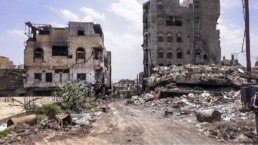There are just three flights leaving Sana’a every week. But Yemen has an estimated 71,000 cancer patients who need out-of-country care.
By Shuaib Almosawa and Sarah Lazare, Workday
Raneem Isa Muhammad Jaber dreams of swinging in a playground or participating in a popular pastime called sahlilah, in which children use cut plastic containers to skate down a hill. “I want to play all the games, but I can’t,” said the 11-year-old, who has suffered since birth from a skin condition that leaves black spots all over her body and an itchy and painful black tumor-like growth that covers her backside. “I can’t sit down, I can’t walk, and I can’t sleep.”

She lives in the Yemeni port city of Al Hudaydah, which opens to the Red Sea. Her family is poor, but used to scrape together funds—often provided by local donors—to travel to India, the most affordable nearby option for medical care after years of war decimated Yemen’s health system. There, surgeons would excise growths from her body. Her medical providers say that she should return every six months. But her father, Isa Muhammad Jaber, said the last time she went was in 2018.
The closest international airport that doesn’t require Raneem to make the dangerous and expensive journey from the Houthi-controlled areas where she lives to those under the authority of the Presidential Leadership Council (PLC) is in the city of Sana’a. A Saudi-led military coalition, which includes the United States, bombed that airport multiple times during the war, and closed it to commercial flights.
In April 2022, Saudi Arabia entered into a truce with the Houthis and, working with the United Arab Emirates, another country on the Saudi side of the war, established the PLC. This eight-member council came to power without an election, replacing President Abd-Rabbu Mansour Hadi. The United States now considers this the “internationally recognized government” of Yemen. The truce was supposed to reopen Sana’a airport to commercial air travel, a development that has been touted by the Biden administration as proof of progress in a humanitarian crisis for which the US bears considerable responsibility.
Recent Posts
Carrying On Kent State’s Legacy Of Antiwar Organizing, Students Press For Divestment
May 19, 2024
Take Action Now Students at Kent State won disclosure of the university’s investment portfolio, but the fight to divest from the war industry is…
Biden Administration Moves To Reclassify Marijuana: A Major Shift In U.S. Drug Policy
May 17, 2024
Take Action Now President Biden’s Department of Justice takes historic steps to reclassify marijuana, aiming to end a ‘failed approach’ and…
‘Worse Than Iraq’: Three Former Biden Officials Explain Why They Resigned Over War In Gaza
May 16, 2024
Take Action Now “There’s just this blind unwillingness to recognize the U.S. does have all the power here – this notion that it’s not really…
Reflections On Student Activism
May 16, 2024
Take Action Now William Hartung, Democracy Versus Autocracy on America’s Campuses By William D. Hartung, Tom Dispatch I’ve spent most of my…




